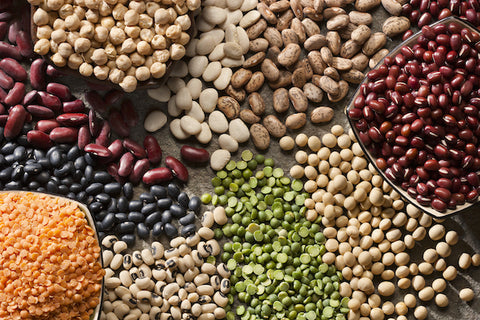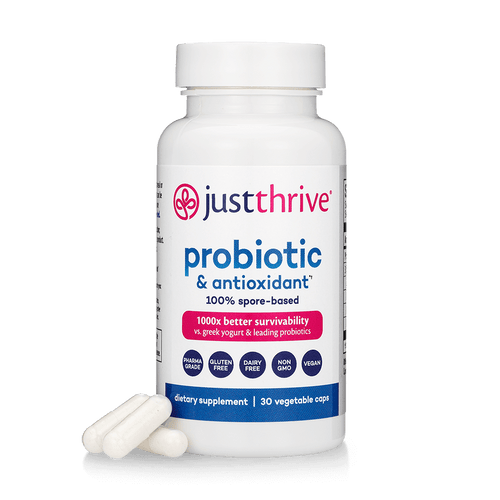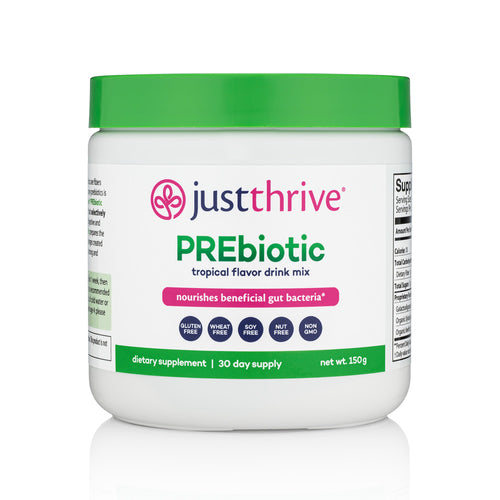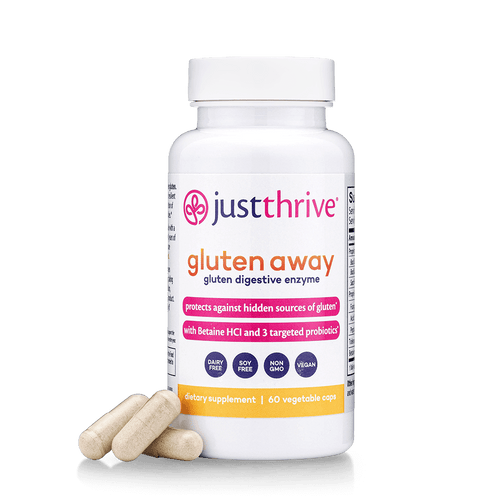Step one for a happy and healthy gut.
If you’ve been dealing with leaky gut, you’ve probably made some big changes to your diet. Maybe you cut out dairy products and gluten. Maybe you gave up sugar or alcohol. And it’s hard to remove all the fun foods from your life… so you at least want to see results, right?
There’s a reason you’re still suffering with symptoms and that your leaky gut hasn’t resolved…
You’re still eating foods that trigger leaky gut. Only these are foods you’d never expect to have to give up.
And of course changing your diet is an important step toward remedying a leaky gut… but it’s only the first step. You need a complete plan of attack to get your gut barrier—and your gut microbiome—back in top shape.
What Does Leaky Gut Feel Like?
Some leaky gut symptoms are exactly what you’d expect: diarrhea, IBS (irritable bowel syndrome), gas, and bloating.
Others might take you by surprise, because they have nothing to do with your gut, at least not directly. But leaky gut can affect many body systems and cause a shocking range of issues including:[1]
- Brain fog
- Anxiety
- Depression
- Skin issues like acne and eczema
- Asthma
- PMS
Leaky gut has also been linked with many chronic and autoimmune diseases including fibromyalgia[2], Hashimoto’s thyroiditis (also called autoimmune thyroid)[3], and rheumatoid arthritis.[4]

What Exactly Is Leaky Gut Anyway?
Leaky gut is just what it sounds like, but maybe not in the way you’re thinking. Your large intestine—your gut—is lined with a protective mucosal barrier.[5] That barrier uses a process called selective permeability to decide what gets through. When the mucosal barrier is working at full strength, only healthy substances like nutrients and antioxidants pass into your bloodstream. Harmful bacteria, toxins, and other pathogens get locked inside so they can be eliminated.
Your gut barrier acts like a shield to keep your whole body safe. But it’s highly vulnerable to all sorts of threats, like pathogens, toxins, and free radicals. The threat list also includes natural compounds found in some of the foods you’d normally eat.
One of the gut barrier’s main threats comes from LPS toxins (lipopolysaccharides). Harmful bacteria in your gut microbiome—the trillions of bacteria that live in your gut—produce LPS toxins. When your gut is in healthy balance, it can handle LPS toxins easily. But when pathogens outnumber beneficial bacteria in your gut, a condition called dysbiosis, your body can’t manage the toxic overload.
LPS toxins attack your gut barrier constantly until it becomes weak enough for them to get through.[6] That’s a leaky gut… and it can be worse than it sounds. When you’re dealing with a leaky gut, pathogens and toxins can move into your bloodstream and cause problems everywhere in your body.[7]
So to keep your gut barrier as strong as possible, you need to be proactive. And that includes not eating foods that can break it down.
Avoid These Foods (Yes, Really!)
You’ve probably heard the standard advice for dealing with gut issues. Avoid dairy, gluten, sugar, and alcohol. And that’s good advice when you’re trying to give your digestive system—especially your gut barrier—a chance to bounce back.
But that’s just one part of the list of foods that can trigger and worsen leaky gut. You’ve probably never been told to avoid these foods and might even have been told to eat plenty of them for a healthy diet.
All of these foods contain chemicals that can damage your gut barrier and throw your gut microbiome out of balance, making the gut barrier problems even worse. So as you’re working to get your digestive tract back on track, avoid these off-the-radar foods… at least temporarily.
The best way to figure out which foods are causing issues is an elimination diet. To do that, you remove all of the potential problem foods from your diet for a couple of weeks (at least). Then you add them back in one by one, in whatever order you like, to see which ones cause flare-ups.
If that feels like too much, you could remove one "food group" at a time from the below list and monitor how you are affected. If there is no change, you can bring those foods back in and then move on to the next food group, repeating the process.
The key foods to remove for leaky gut include these…
Nightshades
There are thousands of nightshade plants, but we eat only a few of them—and those are some of the most popular veggies. All nightshades produce a toxic compound called solanine. Some, like belladonna, are toxic enough that they could kill you. The kind we eat have much lower levels, but still enough to do damage to your gut barrier.[8]
What nightshades are you eating?
- Tomatoes
- Potatoes
- Peppers
- Eggplant
And that includes all forms of them, like paprika, chili powder, and cayenne for peppers. (Black pepper is not on this list because peppercorns are from a different type of plant.)
You probably eat multiple servings of nightshades every day (most of us do!). So kicking them out of your diet completely, at least temporarily, can go a long way toward letting your gut barrier get back to fighting strength.

Lectins
Plants create special proteins called lectins to defend themselves against bugs and some plant-eating animals. Some lectins are toxic… even deadly… and even the milder ones may cause digestive issues.[9] That’s because lectins resist being broken down by your digestive enzymes, so they can get through your digestive tract in their full-powered forms.
Most edible plants have low lectin levels and won’t cause harm. But some foods we commonly eat have very high lectin levels, and those can trigger leaky gut and cause dysbiosis. High lectin foods include:
- Peanuts
- Soybeans
- Kidney beans
- Lentils
- Peas
- Quinoa
- Whole grains (including wheat)
Nightshades also contain high lectin levels—another reason to avoid them to give your leaky gut some relief.
FODMAPS
Fermentable, oligosaccharides, disaccharides, monosaccharides, and polyols—FODMAPs—are foods that contain specific carbohydrates that can be difficult for the body to fully break down. They resist digestion, so they can linger in the intestine and contribute to leaky gut.[10]
Following a low FODMAP diet can help alleviate some gut issues and give your gut barrier a break—but it can be hard to follow. Many common foods are high FODMAPs, such as:
- Apples and apple juice
- Garlic
- Onions
- Mushrooms
- Green peas
- Cherries
- Pears
- Watermelon
- Dried fruits
- Bread
- Breakfast cereals
- Dairy products
- Soy milk
- Legumes
- Processed meats
- Pistachios
That is not a complete list of high FODMAP foods; it’s extensive and following a low FODMAP diet can feel very restrictive and super frustrating. But it doesn’t have to be forever.
Removing these foods—along with nightshades and lectins—from your diet could help ease your discomfort and give your gut a chance to get to a healthier state. Then you can slowly and safely add these foods back to see which don’t cause problems for you.
And to keep your gut barrier intact, strong, and functioning properly all the time, you need to adopt a more proactive strategy.
Your Complete Gut Health Strategy
Removing foods that can add to gut barrier attacks is an important step in keeping it strong. But it’s not the only step you’ll need to take. Along with dietary changes, you’ll need to supply direct support to your gut barrier so it can function properly. And you’ll also have to make sure your gut microbiome is in healthy balance, full of beneficial probiotic bacteria.
Your gut barrier needs very specific support:
- Plentiful supplies of amino acids to create a protective protein called Mucin2 to make sure the barrier is fully coated with thick, gel-like mucus, thick enough to block attackers [11,12]. That calls for four key amino acids: L-proline, L-serine, L-cysteine, and L-threonine.[13]
- Powerful antioxidants to protect against free radicals that cause damage.[14]
- Unique beneficial plant chemicals—citrus polyphenols—to protect and nourish the mucosal gut barrier.[15]
The best way to keep your gut microbiome well-balanced is to deliver fresh probiotics daily—preferably spore probiotics that can withstand heat and acid to arrive at your gut alive and ready to work. And to make sure those beneficial probiotic bacteria thrive, nourish them with prebiotics, their preferred food… and one that harmful bacteria can’t stand. Spore probiotics and prebiotics give your gut microbiome what it needs to stay healthy and balanced, so it can help keep your gut barrier strong and solid.
Keep Your Protective Gut Barrier Strong
It’s amazing how many everyday foods can mess with your gut barrier and lead to all kinds of distress. Avoiding those foods can make a huge difference in your gut health. But to really keep your gut barrier strong, thick, and working at its full capacity, you’ll need to give it regular love and support.
Gut 4-tify delivers the daily support your gut barrier needs to stay healthy:
- L-proline, L-serine, L-cysteine, and L-threonine to support plentiful production of Mucin2
- A powerful antioxidant blend that can help keep free radicals under control
- A natural citrus polyphenol extract that supports optimal gut barrier function
Just Thrive Probiotic & Antioxidant contains a unique blend of four spore probiotics shown in a clinical trial to reduce LPS toxins after eating by 42%.[16] And Just Thrive PREbiotic supplies the perfect food for a wide variety of beneficial probiotic bacteria (while NOT feeding the bad bacteria) so they can flourish in a healthy gut microbiome.
Ready to take proactive steps to keep your gut as healthy as possible so you can feel your best every day?
Keep your gut barrier strong, healthy, and ready to act as your body’s wellness shield with Gut 4-tify, Just Thrive Probiotic, and Just Thrive PREbiotic.
But if you’re not sure about trying Just Thrive, we can help with that.
EVERY Just Thrive purchase is covered by our Bottom of the Bottle, 100% money back guarantee.
So you can try Gut 4-tify, Just Thrive Probiotic, and Just Thrive PREbiotic to see if they work for you… and we’re confident they will.
But if for any reason you don’t feel a difference, simply ask for a full product refund. Any time. Even if it’s been 3 months… or 3 years. Even if the bottle is empty! You’ll get your money back at any time if you’re not fully satisfied.
>> Tap HERE to test drive Gut 4-Tify, Just Thrive Probiotic, Just Thrive PREbiotic, 100% RISK-FREE, and save 30% on your first month’s subscription with code SUB30.
- Camilleri M. Leaky gut: mechanisms, measurement and clinical implications in humans. Gut. 2019 Aug;68(8):1516-1526. doi: 10.1136/gutjnl-2019-318427. Epub 2019 May 10. PMID: 31076401; PMCID: PMC6790068.
- Erdrich S, Hawrelak JA, Myers SP, Harnett JE. Determining the association between fibromyalgia, the gut microbiome and its biomarkers: A systematic review. BMC Musculoskelet Disord. 2020 Mar 20;21(1):181. doi: 10.1186/s12891-020-03201-9. PMID: 32192466; PMCID: PMC7083062.
- Cayres LCF, de Salis LVV, Rodrigues GSP, Lengert AVH, Biondi APC, Sargentini LDB, Brisotti JL, Gomes E, de Oliveira GLV. Detection of Alterations in the Gut Microbiota and Intestinal Permeability in Patients With Hashimoto Thyroiditis. Front Immunol. 2021 Mar 5;12:579140. doi: 10.3389/fimmu.2021.579140. PMID: 33746942; PMCID: PMC7973118.
- Taneja V. Arthritis susceptibility and the gut microbiome. FEBS Lett. 2014 Nov 17;588(22):4244-9. doi: 10.1016/j.febslet.2014.05.034. Epub 2014 May 27. PMID: 24873878; PMCID: PMC4246018.
- Assimakopoulos SF, Triantos C, Maroulis I, Gogos C. The Role of the Gut Barrier Function in Health and Disease. Gastroenterology Res. 2018 Aug;11(4):261-263. doi: 10.14740/gr1053w. Epub 2018 Feb 8. PMID: 30116424; PMCID: PMC6089582.
- Ghosh SS, Wang J, Yannie PJ, Ghosh S. Intestinal Barrier Dysfunction, LPS Translocation, and Disease Development. J Endocr Soc. 2020 Feb 20;4(2):bvz039. doi: 10.1210/jendso/bvz039. PMID: 32099951; PMCID: PMC7033038.
- Camilleri M. Leaky gut: mechanisms, measurement and clinical implications in humans. Gut. 2019 Aug;68(8):1516-1526. doi: 10.1136/gutjnl-2019-318427. Epub 2019 May 10. PMID: 31076401; PMCID: PMC6790068.
- Patel B, Schutte R, Sporns P, Doyle J, Jewel L, Fedorak RN. Potato glycoalkaloids adversely affect intestinal permeability and aggravate inflammatory bowel disease. Inflamm Bowel Dis. 2002 Sep;8(5):340-6. doi: 10.1097/00054725-200209000-00005. PMID: 12479649.
- Adamcová A, Laursen KH, Ballin NZ. Lectin Activity in Commonly Consumed Plant-Based Foods: Calling for Method Harmonization and Risk Assessment. Foods. 2021 Nov 13;10(11):2796. doi: 10.3390/foods10112796. PMID: 34829077; PMCID: PMC8618113.
- Aleman RS, Moncada M, Aryana KJ. Leaky Gut and the Ingredients That Help Treat It: A Review. Molecules. 2023 Jan 7;28(2):619. doi: 10.3390/molecules28020619. PMID: 36677677; PMCID: PMC9862683.
- Tadesse S, Corner G, Dhima E, Houston M, Guha C, Augenlicht L, Velcich A. MUC2 mucin deficiency alters inflammatory and metabolic pathways in the mouse intestinal mucosa. Oncotarget. 2017 Apr 6;8(42):71456-71470.
- Cornick S, Tawiah A, Chadee K. Roles and regulation of the mucus barrier in the gut. Tissue Barriers. 2015 Apr 3;3(1-2):e982426. doi: 10.4161/21688370.2014.982426. PMID: 25838985; PMCID: PMC4372027.
- Faure M, Mettraux C, Moennoz D, Godin JP, Vuichoud J, Rochat F, Breuillé D, Obled C, Corthésy-Theulaz I. Specific amino acids increase mucin synthesis and microbiota in dextran sulfate sodium-treated rats. J Nutr. 2006 Jun;136(6):1558-64. doi: 10.1093/jn/136.6.1558. PMID: 16702321.
- Yajie Wang, Y. Wang, Yue Chen, Y. Chen, Xiaoyu Zhang, X. Zhang, Yangpeng Lu, Y. Lu, & Haixia Chen, H. Chen. (0000). New insights in intestinal oxidative stress damage and the health intervention effects of nutrients: A review. Journal of functional foods, 75, 104248.
- Stevens Y, Rymenant EV, Grootaert C, Camp JV, Possemiers S, Masclee A, Jonkers D. The Intestinal Fate of Citrus Flavanones and Their Effects on Gastrointestinal Health. Nutrients. 2019 Jun 27;11(7):1464. doi: 10.3390/nu11071464. PMID: 31252646; PMCID: PMC6683056.
- McFarlin BK, Henning AL, Bowman EM, Gary MA, Carbajal KM. Oral spore-based probiotic supplementation was associated with reduced incidence of post-prandial dietary endotoxin, triglycerides, and disease risk biomarkers. World J Gastrointest Pathophysiol. 2017 Aug 15;8(3):117-126. doi: 10.4291/wjgp.v8.i3.117. PMID: 28868181; PMCID: PMC5561432.














